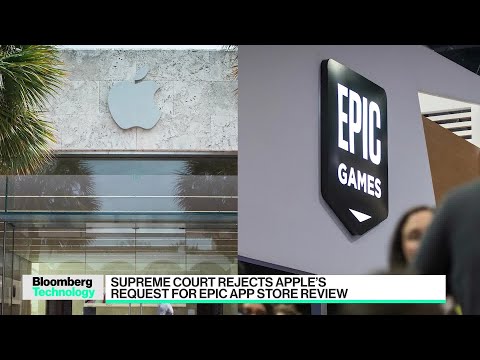
Supreme Court Rejects Apple Bid for an Epic App Store Review
It’s hard to understand the legalese here because it’s an appeal of an appeal. But explain this morning’s news to our audience. And thanks for having me this morning, as always. Yes. So let me explain. Epic Games, Apple, they were in this major lawsuit a few years ago over the App Store. Apple won most of the lawsuit. Right. Apple won in the sense they were not designated a monopoly. But there was one little carve up that Apple lost on and that was known as a steering provision. The idea where the judge ruled that Apple should allow
developers to include a button inside of their applications to point users external to the App Store to complete their transactions. Now, why is that such a big deal? Because primarily applications downloaded via the App Store to the iPhone of the iPad have to use Apple’s in-app billing system that takes between a 15% and a 30% cut. In fact, the majority of Apple services revenue likely comes from transactions and in-app purchases made through the App Store. And Apple had been appealing that for the last several months, all the way up to the Supreme Court. Epic had
also been appealing their losses in that initial trial in California up to the Supreme Court today. Tuesday, the Supreme Court decided they’re not going to hear either
to see when they’re going to implement this and exactly how. The interesting other tidbit here is March 7th is when the Digital Markets Act comes into place. The Digital Markets app is in the European Union. This is going to require Apple to open up the App store there, allow outside billing. So it’s possible Apple’s going to try to use that same technology to open up the billing in the U.S. as well. Or they may take another method. We’ll have to wait and see. But either way, not great news for Apple this morning. More epic. Yeah,
we had the European Commission executive Vice President Margrethe Vestager on with me live last Friday. And her message was, well, I’m meeting with Tim Cook. That meeting happened. You know, you have to comply by March seven. And what she told me was she was going to explain to Tim Cook and other CEOs how they could comply. Let’s get back to the App Store dispute. There’s an iOS iPhone use consideration here, a technology consideration that if the high court puts into effect the appeals courts a reasonable decision, you as a developer of an iOS app can
can direct the consumer elsewhere outside of the iOS ecosystem. Right. Just explain if I’m an iPhone user, what I might see going forward. Yeah. So if you’re an iPhone user right now and let’s say you all use Fortnite as an example, let’s say Fortnite, we’re still in the App Store. You want to buy a new character, you want to buy a bundle. So you click that. Maybe it’s priced at $10. And traditionally what you would have to do is use your app store credentials. You get a pop up through the App Store, you would approve
it with touch ID your password or face ID, it’s $10. $7 of that would go to the developer, $3 go to Apple. Now, when this comes into effect, that button, maybe you’ll be able to go to a website to finish your transaction. Maybe you’ll use Stripe, for example. And the vast majority in that case of the revenue will then go to the developer. Stripe charges maybe three and 4%. Maybe it goes through PayPal. They take a few percentage points. So it’s going to mean less revenue for Apple, more revenue for the developer. Now there is
a scenario here where even if apps can point developers to collect payments outside of the App Store, Apple could still have a method to collect that payment from the developer. Maybe the developer at the end of each month needs to write Apple a check. This is something they’ve done with dating apps in the Netherlands that has required a similar rule, but Apple is still trying to collect that money. Instead of charging a 30% fee, they charge something like 26 or 27%. So taking out that processing fee from there, too. So it is going to be
very interesting to see how Apple implements this. I would imagine, as they should, they will implement it in the way that’s most advantageous to their bottom line.
